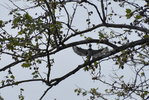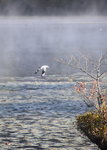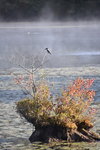 Narrowsburg
NarrowsburgLight Rain Fog/Mist, 43°
Wind: 8.1 mph
 Narrowsburg
NarrowsburgYou might be paddling down the Delaware River, or walking along the shoreline of a local lake when you hear it—the distinctive chittering cries of a belted kingfisher. The loud rattle-like …
Stay informed about your community and support local independent journalism.
Subscribe to The River Reporter today. click here
This item is available in full to subscribers.
Please log in to continue |




You might be paddling down the Delaware River, or walking along the shoreline of a local lake when you hear it—the distinctive chittering cries of a belted kingfisher. The loud rattle-like calls of this sprightly bird alert listeners to the whereabouts of this feathered fish-lover.
But you’d better have your binoculars at the ready to capture a good view of this zippy blue-gray bird, whose underside is mostly white with a broad, blue breast band. Females are differentiated by a rust-colored band on their bellies.
Roughly the size of a robin, kingfishers have large heads topped with spiky crests. Their short legs and straight, thick bills are other recognizable features. Their preferred habitat includes ponds, streams, lakes, rivers and estuaries. Kingfishers are often encountered flying speedily up and down our regional rivers, patrolling select territories while delivering their recognizable calls.
For nesting, kingfishers excavate burrows in earthen banks. The male and female share this task, which can take up to several weeks to complete. Five to eight white glossy eggs are laid, which incubate between 22 to 24 days; hatchlings are helpless and bare-skinned, with closed eyes.
The poet, Mary Oliver, reflected on the characteristics of these masterful fishers in this excerpt from her poem, “The Kingfisher.”
The kingfisher rises out of the black wave
like a blue flower, in his beak
he carries a silver leaf. I think this is
the prettiest world—so long as you don’t mind
a little dying, how could there be a day in your
whole life
that doesn’t have its splash of happiness?
Comments
No comments on this item Please log in to comment by clicking here